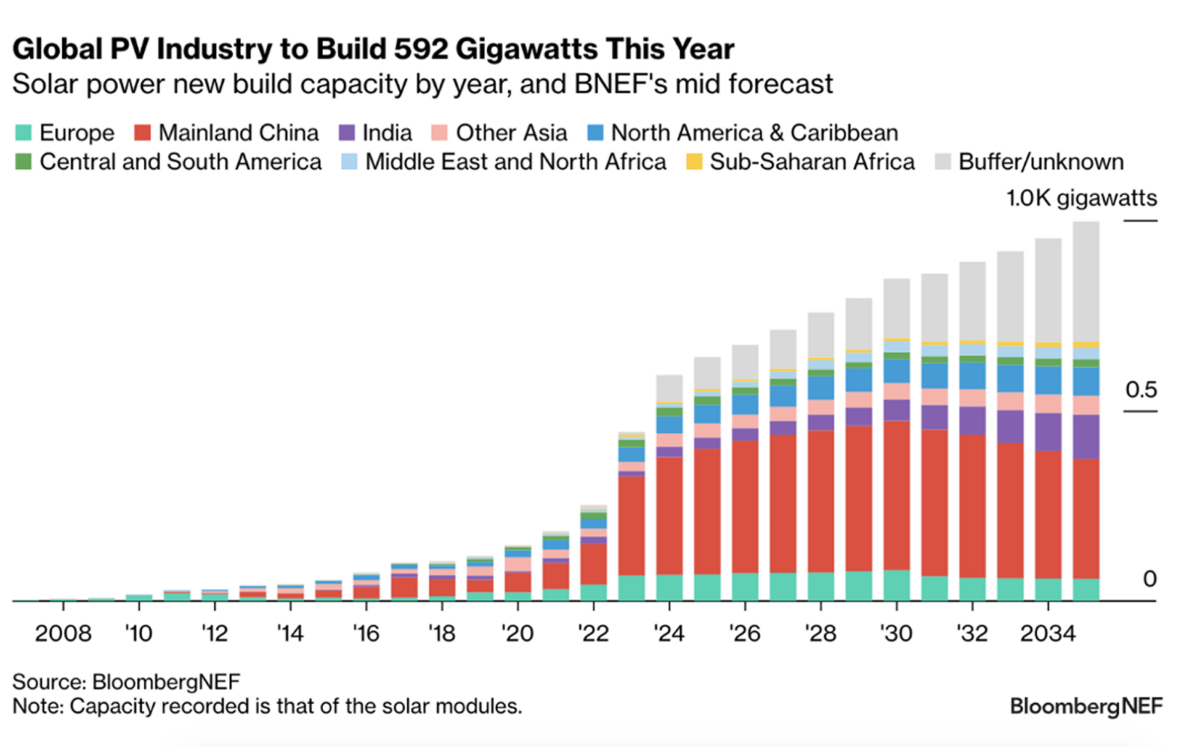The global solar industry is on track to install 592 GW of modules this year, up 33% from 2023, according to a new report from BloombergNEF. It said in its its “3Q 2024 Global PV Market Outlook” that “low prices for modules are stimulating demand in new markets this year, but hurting manufacturers, who are competing intensely to maintain market share.”
Quarter-on-quarter analysis shows a 1% increase across the world’s largest 28 markets. Pakistan, Saudi Arabia, and India lead the largest developments, while Japan and South Africa experience notable decreases.The most established solar markets continue to build steadily.
The report forecasts steady year-on-year increases in solar module installations, reaching 996 GW by 2035. BloombergNEF has also reduced its 2024 estimate for polysilicon production to 1.96 million metric tons – enough to produce 900 GW of modules.
Jenny Chase, BloombergNEF’s lead solar analyst, told pv magazine that the main reason for the polysilicon output reduction from 2.2 million tons of estimated annual output in the second quarter of 2024, is “that manufacturers are scheduling maintenance or using other ways to temporarily reduce production, due to the low prices and oversupply.” The report states that polysilicon prices are currently $4.9/kg, below production costs for nearly all manufacturers.
Meanwhile, module prices have dipped to $0.096/W, which the report says is the lowest level ever. BloombergNEF said most solar manufacturers are expected to report losses this year and warned that some will not survive this cycle.
“Systemic overcapacity in the solar supply chain has led to continued price declines,” it said. “Manufacturers face losses across all segments of the supply chain from polysilicon to modules, and have responded with pay cuts, cost reductions, layoffs, and even delayed payments to suppliers while attempting to maintain production.”
BloombergNEF forecasts a module price below $0.10/W for products based on tunnel oxide passivated contact (TOPCon) technology on the free market by the end of the year.
This content is protected by copyright and may not be reused. If you want to cooperate with us and would like to reuse some of our content, please contact: editors@pv-magazine.com.








By submitting this form you agree to pv magazine using your data for the purposes of publishing your comment.
Your personal data will only be disclosed or otherwise transmitted to third parties for the purposes of spam filtering or if this is necessary for technical maintenance of the website. Any other transfer to third parties will not take place unless this is justified on the basis of applicable data protection regulations or if pv magazine is legally obliged to do so.
You may revoke this consent at any time with effect for the future, in which case your personal data will be deleted immediately. Otherwise, your data will be deleted if pv magazine has processed your request or the purpose of data storage is fulfilled.
Further information on data privacy can be found in our Data Protection Policy.